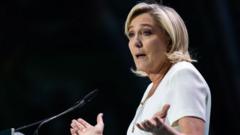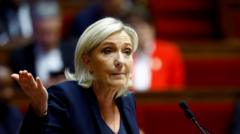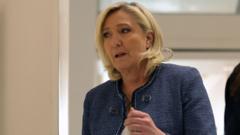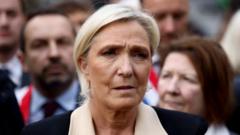As Marine Le Pen awaits trial verdict, France stands at a crossroads, where the intersection of law and politics could reshape its democratic landscape.
Marine Le Pen Faces Potential Ban: A Political Crisis Looms in France

Marine Le Pen Faces Potential Ban: A Political Crisis Looms in France
The upcoming verdict on embezzlement charges against Marine Le Pen raises serious concerns about democracy in France.
In an escalated political drama, Marine Le Pen, the leader of France's far-right party, stands on the brink of potential exclusion from future elections due to serious embezzlement allegations. The trial's verdict, scheduled for Monday, is anticipated not just as a legal decision but as a pivotal moment for the nation's democratic integrity. The outcome could declare Le Pen guilty of misappropriating approximately $4.8 million in European Union funds, a judgment she has labeled a “political death” sentence.
Le Pen's rising profile in French politics complicates the scenario; her party, recently rebranded from the National Front to the National Rally, has very publicly distanced itself from its extremist past. Now the largest party in the National Assembly with 123 seats, any ban against her participation could ignite public outcry and accusations of political bias, particularly toward the surging hard-right factions in France.
On one side, prosecutors argue that legality must prevail in this case, reinforcing the principle that “the law applies to all." Conversely, a segment of France's political spectrum expresses concern that banning Le Pen would be detrimental to democracy. Gérald Darmanin, the justice minister and former center-right interior minister, highlights this sentiment, stating that Le Pen should be countered at the polls rather than through judicial means.
This impending verdict thus encapsulates a broader struggle in France: the balance of upholding law against the risk of tarnishing the democratic process during a time of heightened political volatility. As emotions run high and the nation awaits the ruling, France's commitment to its democratic principles hangs in the balance alongside the fate of Marine Le Pen.
Le Pen's rising profile in French politics complicates the scenario; her party, recently rebranded from the National Front to the National Rally, has very publicly distanced itself from its extremist past. Now the largest party in the National Assembly with 123 seats, any ban against her participation could ignite public outcry and accusations of political bias, particularly toward the surging hard-right factions in France.
On one side, prosecutors argue that legality must prevail in this case, reinforcing the principle that “the law applies to all." Conversely, a segment of France's political spectrum expresses concern that banning Le Pen would be detrimental to democracy. Gérald Darmanin, the justice minister and former center-right interior minister, highlights this sentiment, stating that Le Pen should be countered at the polls rather than through judicial means.
This impending verdict thus encapsulates a broader struggle in France: the balance of upholding law against the risk of tarnishing the democratic process during a time of heightened political volatility. As emotions run high and the nation awaits the ruling, France's commitment to its democratic principles hangs in the balance alongside the fate of Marine Le Pen.





















